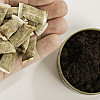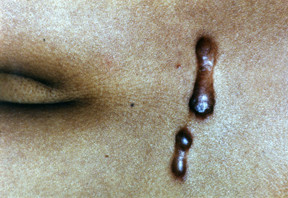Recent Blog Articles

Lead poisoning: What parents should know and do

How does waiting on prostate cancer treatment affect survival?

Does running cause arthritis?

Is alcohol and weight loss surgery a risky combination?

Preventing ovarian cancer: Should women consider removing fallopian tubes?

Healthier planet, healthier people

Is snuff really safer than smoking?

Will miscarriage care remain available?

Considering collagen drinks and supplements?

Does less TV time lower your risk for dementia?
Keloids
What Is It?
Keloids are raised overgrowths of scar tissue that occur at the site of a skin injury. They occur where trauma, surgery, blisters, vaccinations, acne or body piercing have injured the skin. Less commonly, keloids may form in places where the skin has not had a visible injury. Keloids differ from normal mature scars in composition and size. Some people are prone to keloid formation and may develop them in several places.
|
Keloids are more common in African-Americans. They are seen most commonly on the shoulders, upper back and chest, but they can occur anywhere. When a keloid is associated with a skin incision or injury, the keloid scar tissue continues to grow for a time after the original wound has closed, becoming larger and more visible until it reaches a final size. They generally occur between 10 and 30 years of age and affect both sexes equally, although they may be more common among young women with pierced ears. Keloids may form over the breastbone in people who have had open heart surgery.
To continue reading this article, you must log in.
Subscribe to Harvard Health Online for immediate access to health news and information from Harvard Medical School.
- Research health conditions
- Check your symptoms
- Prepare for a doctor's visit or test
- Find the best treatments and procedures for you
- Explore options for better nutrition and exercise
I'd like to receive access to Harvard Health Online for only $4.99 a month.
Sign Me UpAlready a member? Login ».
Disclaimer:
As a service to our readers, Harvard Health Publishing provides access to our library of archived content. Please note the date of last review or update on all articles.
No content on this site, regardless of date, should ever be used as a substitute for direct medical advice from your doctor or other qualified clinician.
Free Healthbeat Signup
Get the latest in health news delivered to your inbox!

